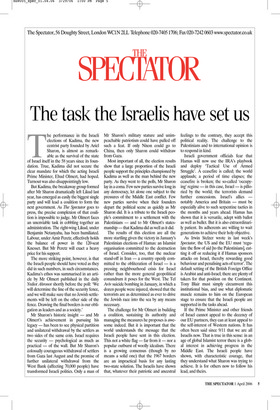The task the Israelis have set us
The performance in the Israeli elections of Kadima, the new centrist party founded by Ariel Sharon, is almost as remarkable as the survival of the state of Israel itself in the 58 years since its foundation. True, Kadima did not secure the clear mandate for which the acting Israeli Prime Minister, Ehud Olmert, had hoped. Turnout was also disappointingly low.
But Kadima, the breakaway group formed after Mr Sharon dramatically left Likud last year, has emerged as easily the biggest single party and will lead a coalition to form the next government. As The Spectator goes to press, the precise complexion of that coalition is impossible to judge. Mr Olmert faces an unenviable task in cobbling together an administration. The right-wing Likud, under Benjamin Netanyahu, has been humiliated. Labour, under Amir Peretz, effectively holds the balance of power in the 120-seat Knesset. But Mr Peretz will exact a heavy price for his support.
The more striking point, however, is that the Israeli people should have voted as they did in such numbers, in such circumstances. Kadima’s ethos was summarised in an article by Mr Olmert published in the daily Yediot Ahronot shortly before the poll: ‘We will determine the line of the security fence, and we will make sure that no Jewish settlements will be left on the other side of the fence. Drawing the final borders is our obligation as leaders and as a society.’ Mr Sharon’s historic insight — and Mr Olmert’s achievement in pursuing his legacy — has been to see physical partition and unilateral withdrawal by the settlers as two sides of the same coin. Israel requires the security — psychological as much as practical — of the wall. But Mr Sharon’s colossally courageous withdrawal of settlers from Gaza last August and the promise of further unilateral withdrawal from the West Bank (affecting 70,000 people) have transformed Israeli politics. Only a man of Mr Sharon’s military stature and unimpeachable patriotism could have pulled off such a feat. If only Nixon could go to China, then only Sharon could withdraw from Gaza.
Most important of all, the election results show that a large proportion of the Israeli people support the principles championed by Kadima as well as the man behind the new party. As they went to the polls, Mr Sharon lay in a coma. Few new parties survive long in any democracy, let alone one subject to the pressures of the Middle East conflict. Few new parties survive when their founders depart the political scene as quickly as Mr Sharon did. It is a tribute to the Israeli people’s commitment to a settlement with the Palestinians — and to Mr Olmert’s statesmanship — that Kadima did as well as it did.
The results of this election are all the more startling given the victory in January’s Palestinian elections of Hamas: an Islamist organisation committed to the destruction of Israel. Consider, too, that the nuclear stand-off in Iran — a country openly committed to the obliteration of Israel — is a pressing neighbourhood crisis for Israel rather than the more general geopolitical conundrum it poses for the West. The Tel Aviv suicide bombing in January, in which a dozen people were injured, showed that the terrorists are as determined as ever to drive the Jewish race into the sea by any means necessary.
The challenge for Mr Olmert in building a coalition, sustaining its authority and managing the measures he proposes is awesome indeed. But it is important that the world understands the message that the Israeli people have sent in this election. This not a white flag — far from it — nor a popular outburst of woolly idealism. There is a growing consensus (though by no means a solid one) that the 1967 borders are an impractical basis for any lasting two-state solution. The Israelis have shown that, whatever their patriotic and ancestral feelings to the contrary, they accept this political reality. The challenge to the Palestinians and to international opinion is to respond in kind.
Israeli government officials fear that Hamas will now use the IRA’s playbook and deploy ‘Tactical Use of Armed Struggle’. A ceasefire is called; the world applauds; a period of time elapses; the ceasefire is broken; the so-called ‘occupying’ regime — in this case, Israel — is pilloried by the world; the terrorists demand further concessions. Israel’s allies notably America and Britain — must be especially alive to such serpentine tactics in the months and years ahead. Hamas has shown that it is versatile, adept with ballot as well as bullet. But it is also extraordinarily patient. Its adherents are willing to wait generations to achieve their holy objective.
As Irwin Stelzer wrote in last week’s Spectator, the US and the EU must ‘regulate the flow of aid [to the Palestinians], cutting it off or reducing it if Hamas sponsors attacks on Israel, thereby rewarding good behaviour and penalising acts of terror’. The default setting of the British Foreign Office is Arabist and anti-Israel; there are plenty of takers for that position on the Continent. Tony Blair must simply circumvent this institutional bias, and use what diplomatic muscle remains to him on the European stage to ensure that the Israeli people are supported in the tasks ahead.
If the Prime Minister and other friends of Israel cannot appeal to the decency of our EU partners, they can at least appeal to the self-interest of Western nations. It has often been said since 9/11 that we are all Israelis now. That is true in this sense: in an age of global Islamist terror there is a global interest in achieving progress in the Middle East. The Israeli people have shown, with characteristic courage, that they understand what Sharon was trying to achieve. It is for others now to follow his lead, and theirs.


























































































 Previous page
Previous page